If you are looking for Eventbrite alternatives then this article will help you.
Eventbrite has been a frontrunner in the event management and ticketing space for years.
It simplifies the way you organize events and sell tickets.
However, there are times when you might be looking for something different.
Maybe an alternative that fits your specific needs for a particular event or offers more competitive pricing.
With a variety of platforms vying for your attention, finding the right event management tool can be a game-changer for your next conference, concert, or workshop.
Whether you’re seeking advanced features, enhanced customization, or simply a better fit for your budget, there’s a rich landscape of Eventbrite competitors out there for you to explore.
Each alternative comes with its own set of features, strengths, and pricing structures.
This makes it possible to tailor your choice to the unique requirements of your event.
From powerful platforms aimed at large-scale events to free or low-cost solutions ideal for nonprofits or smaller gatherings, you have the flexibility to choose a service that aligns perfectly with your event goals and audience expectations.
Popular Eventbrite Alternatives
When you’re planning an event, it’s crucial to have the right tools to ensure its success.
Here are some well-regarded Eventbrite alternatives to consider for your ticketing and event management needs.
1. Meetup

Meetup stands out as a platform particularly suited for local group meetings and community-oriented events.
It’s great for recurring events as you can foster a community around your event series.
2. Eventzilla
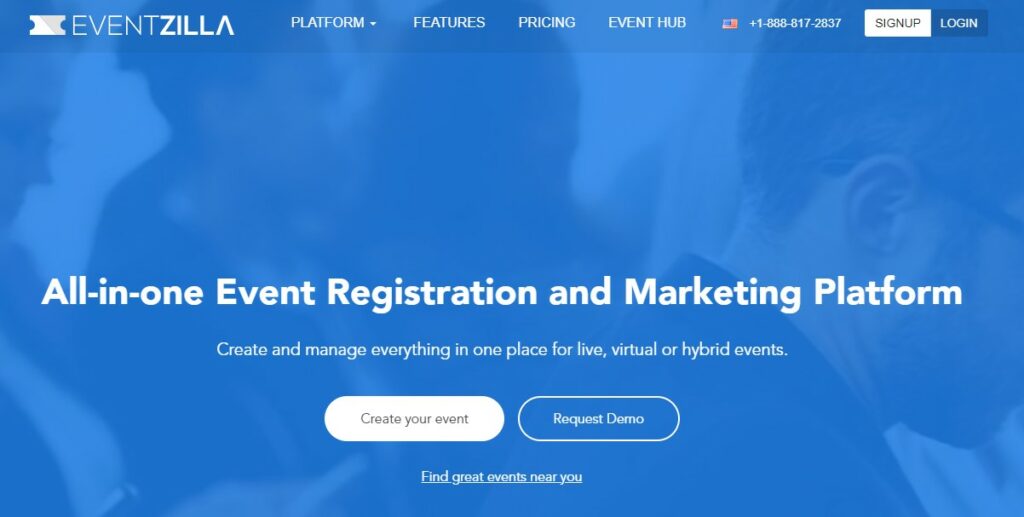
Eventzilla provides you with a simplified event registration platform.
It offers customization options for your event needs.
Flexible pricing and ease-of-use make it a strong alternative, especially for conferences and fundraisers.
3. Cvent
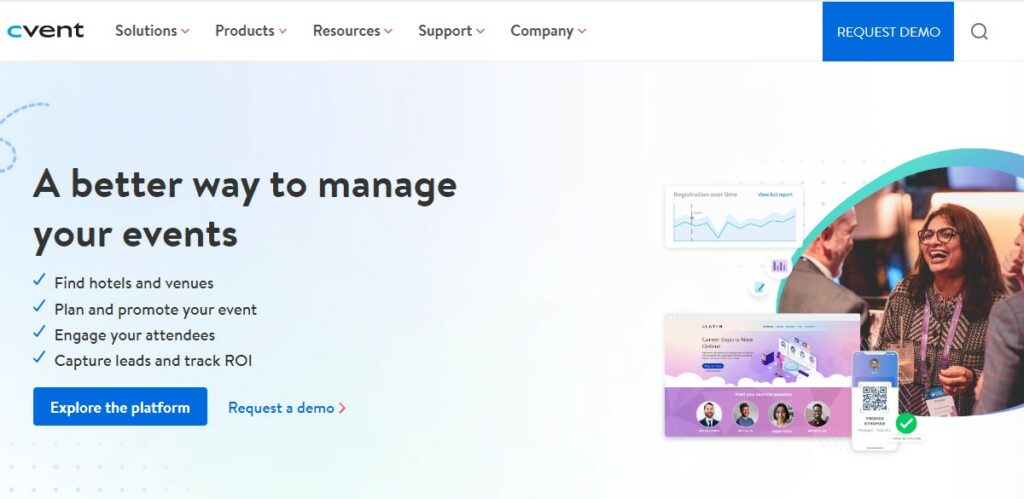
Cvent is a robust event management software that caters to large-scale events.
With a suite of features for event planning, it can accommodate the complexities of bigger, more demanding gatherings.
4. Splash
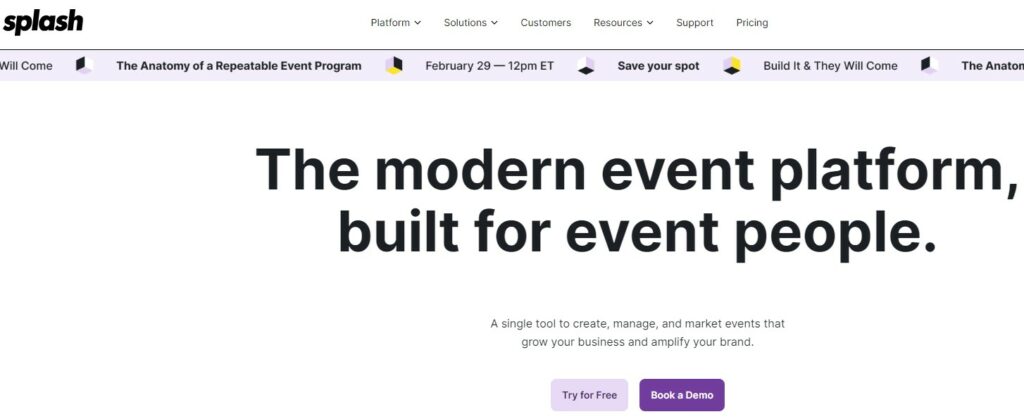
Splash is known for its design-forward platform.
It helps you create aesthetically pleasing event pages.
It’s useful for more brand-centric events where the look and feel are just as important as the logistical details.
5. Ticket Tailor

Ticket Tailor offers a cost-effective approach with lower fees than many of its competitors.
It’s a practical option for those who prefer affordability without sacrificing essential features.
6. Brown Paper Tickets
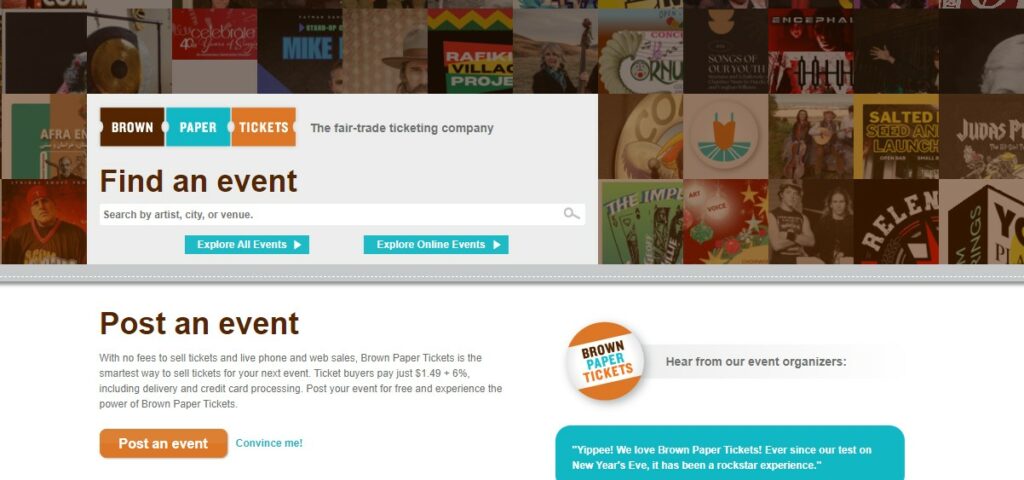
Brown Paper Tickets provides fair-trade ticketing with 24/7 support and service.
It’s a social-conscious choice that supports event organizers with a wide array of event types, from performances to classes.
Niche Event Management Solutions
When you’re looking for event management software that caters directly to the unique needs of your organization, niche solutions can offer specialized features that provide a better fit than one-size-fits-all platforms.
7. Wild Apricot for Nonprofits

Wild Apricot is tailored specifically for nonprofit organizations.
This platform makes it easy for you to manage memberships, fundraising events, and emails, all in one place.
With Wild Apricot, your nonprofit can create and customize a professional-looking website that integrates event registration and member databases.
8. Regpack for Registration
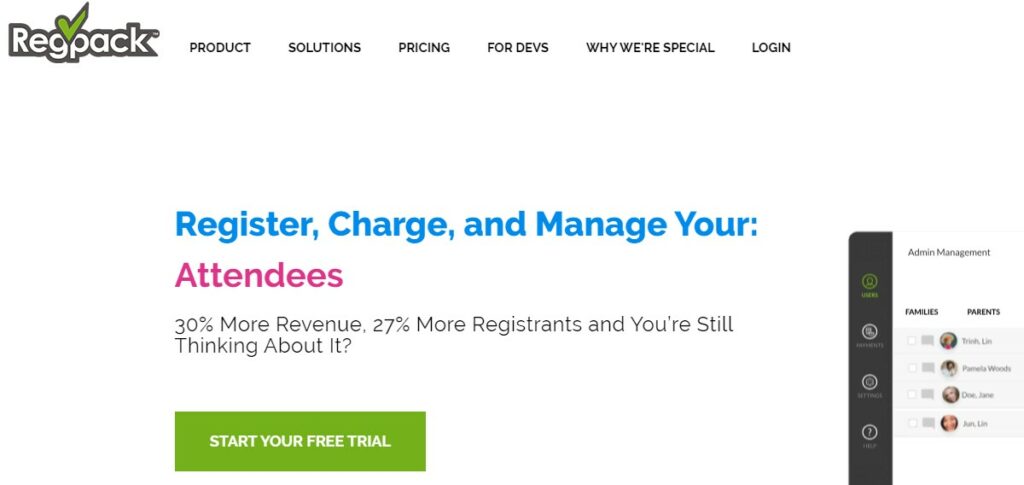
For a seamless sign-up experience, Regpack offers robust registration tools.
This system allows you to embed registration forms directly into your website.
This enables you to collect attendee information, process payments, and offer personalized registration flows based on user responses.
9. Sched for Conferences

If you’re in charge of organizing conferences, Sched is designed to help you manage your event agendas and create an interactive experience for attendees.
With Sched, you can let your participants build their own personal agenda from the overall program and network with other attendees.
10. Eventtia
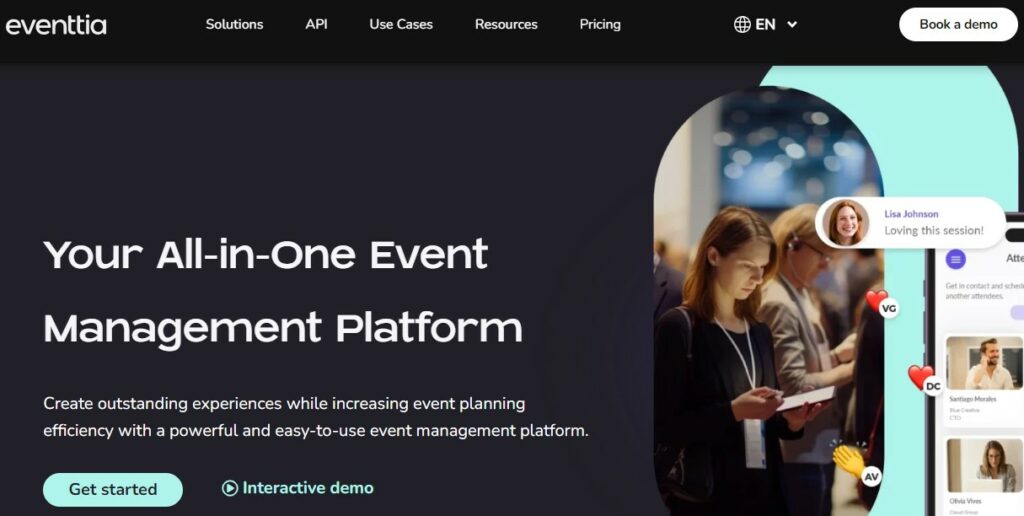
For the cost-conscious, Eventtia offers competitive pricing, especially for luxury, retail, and education sectors.
Pricing:
- Express Plan: Starts at $2500
- Digital Plan: Starts at $2500
- Enterprise Plan: Custom pricing
Features:
- Specialization in luxury and retail events
- Tailored solutions for the educational sector
User Reviews and Ratings:
- Highly rated for its specialized solutions
- Users appreciate the tailored approach for specific industries
11. Whova
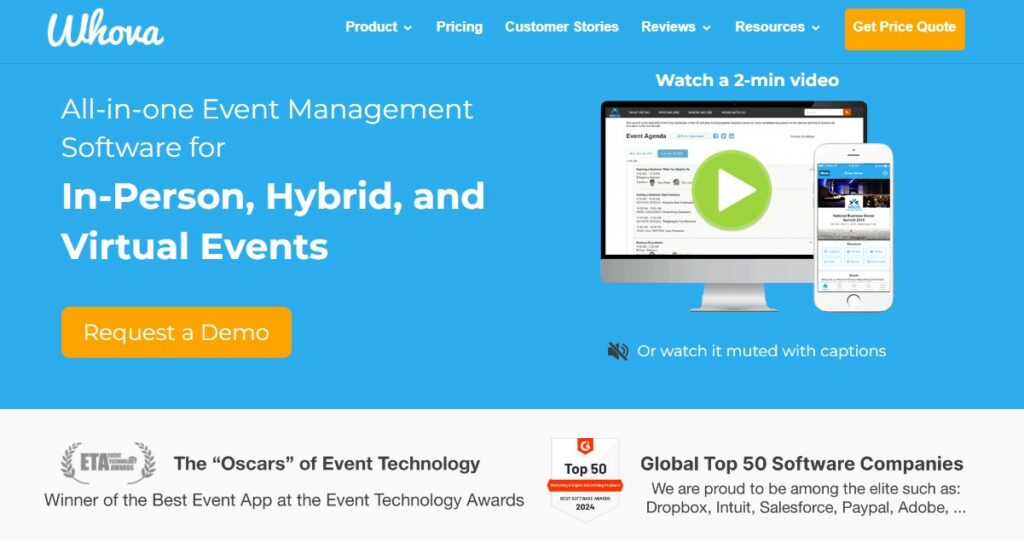
Whova presents a range of pricing options suitable for various event sizes and requirements.
Features:
- Comprehensive ticketing and registration process
- Offers a mobile event app for attendee engagement
User Reviews and Ratings:
- Positively reviewed for its streamlined ticketing experience
- Noted for its user-friendly interface and efficient event management tools
Technology and Innovation
In the realm of event management, staying ahead with the latest technological advancements ensures your events are engaging and streamlined.
Let’s explore some of the innovative options that are redefining the industry.
Mobile Event Apps
Mobile event apps have become essential in enhancing attendee experience by offering easy access to event information, networking opportunities, and personalized schedules.
Eventify and Jotform are examples of platforms that provide mobile app solutions to keep you connected with your event’s progress and attendees.
Virtual Event Platforms
The surge in virtual events has led to the need for robust virtual event platforms.
These platforms provide tools for online registration, virtual networking, and immersive webinar experiences.
A notable alternative is RegFox, known for offering flexible virtual event tools that cater to different event formats.
AI-Powered Event Tools
AI-powered tools are revolutionizing event planning and execution.
They offer valuable insights through data analysis and enhance attendee engagement.
AI can automate attendee matchmaking based on interests, optimize event marketing strategies, and provide real-time analytics to improve future events.
Platforms incorporating AI technologies are leading the charge in creating more dynamic and personalized event experiences.
DIY Event Management
If you’re looking to manage events yourself without platforms like Eventbrite, you have a couple of robust options at your disposal.
WordPress Plugins
WordPress isn’t just for blogs; with the right plugins, it can transform into a powerful event management platform.
Plugins like Events Manager or The Events Calendar allow you to manage bookings, handle tickets, and even coordinate virtual events directly from your WordPress site.
| Plugin | Key Features |
|---|---|
| Events Manager | – Multi-site support – Recurring events – Location management |
| The Events Calendar | – Easy integration – Event tickets – Community events |
By using these plugins, you can manage and promote your events with tools that are integrated into your existing WordPress website.
Building Custom Solutions
For a more tailored experience, building a custom solution based on your precise needs could be the way to go.
You can start by defining your requirements and then either use a framework or code from scratch.
Tools like Django for Python or Ruby on Rails for Ruby simplify the development process by providing a foundation to build upon.
It’s important to note, though, that this route requires technical skills or hiring a developer.
| Approach | Considerations |
|---|---|
| Framework-based | – Time-efficient – Community support |
| Code from Scratch | – Full customization – Potentially higher costs |
Remember to weigh in the development costs, time to market, and ongoing maintenance when deciding between WordPress plugins and building custom solutions.
Making the Choice
When it comes to finding an alternative to Eventbrite for your event needs, it’s crucial to delve into key factors that can sway your decision.
Let’s look at how trial periods, demo scheduling, and community feedback play roles in determining the best fit for you.
Trial Periods
Trial periods are your opportunity to test-drive a platform before committing.
Look for services that offer at least a 14-day trial to give you ample time to explore their features.
During this period, pay close attention to the user experience and functionality:
- Can you easily navigate the interface?
- Are the ticketing and registration processes intuitive?
This hands-on experience is invaluable in assessing whether the platform aligns with your event management workflow.
Demo Scheduling
Demo scheduling allows for a guided exploration of a platform’s capabilities.
When you book a demo, use the chance to ask specific questions related to your event type.
Here’s a quick checklist for your demo:
- Confirm integration capabilities with your existing tools or social media.
- Understand the level of customer support available.
A live demo can provide insight into both the software and the company’s customer service ethos.
Community Feedback
Lastly, community feedback can be a treasure trove of insights.
Check out reviews and ratings on industry forums and discussion boards.
Also, look for feedback on social media groups specific to event planning.
Reading through experiences of peers in your industry can highlight potential pros and cons you may not have considered.
Look for patterns in feedback—consistent issues or praises often point to inherent strengths or weaknesses in the platform.
Key Takeaways
When considering your options for event management solutions, remember that there are several compelling alternatives to Eventbrite in 2024.
Each offers distinct features that may better suit your specific needs.
Keep the following takeaways in mind:
Industry Focus: Identify the platforms that cater specifically to your industry.
They will likely provide more specialized features relevant to your type of events.
Features: Look beyond basic ticketing.
Seek platforms that offer innovative features such as advanced analytics, social media integration, and customizable event pages.
Noteworthy Competitors to Eventbrite:
- Eventdex
- Ticketbud
- Eventbee
- RSVPify
- Ticketmaster
- Accelevents
- Eventsprout
Enterprise Capabilities: If you’re planning large-scale events, check if the platform can handle high traffic and offers enterprise-level security.
Customer Service: Prioritize companies known for excellent customer support.
Reliable help can be a lifesaver during event planning.
Pricing Models: Ensure transparency in pricing to avoid any unexpected charges.
Clear, upfront pricing helps in budgeting and financial planning for your event.

